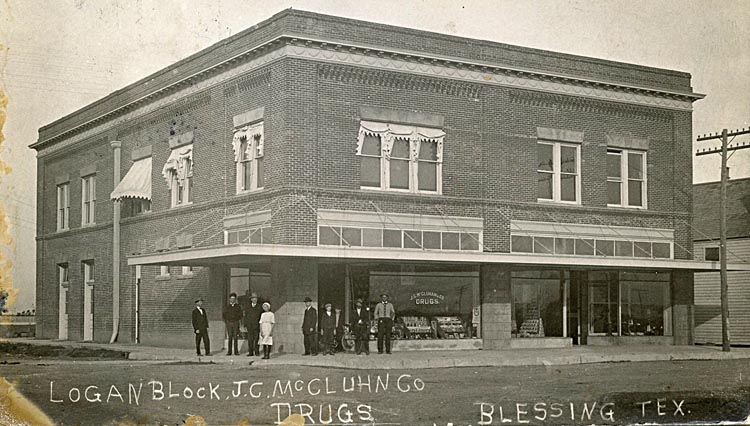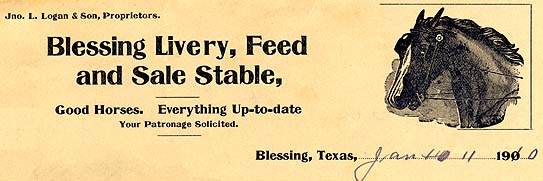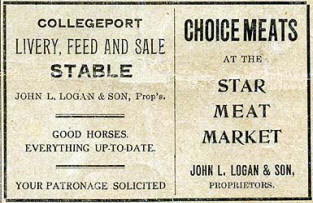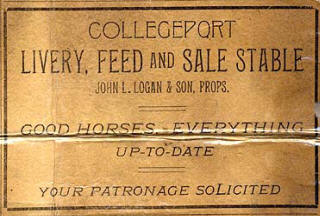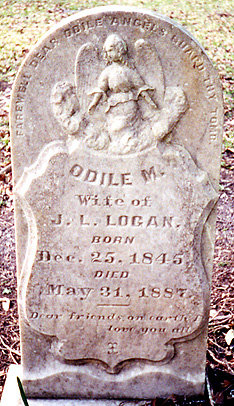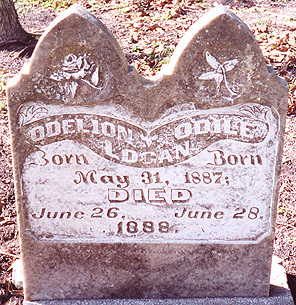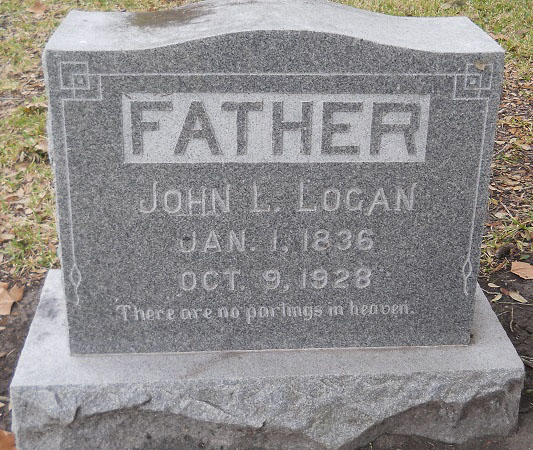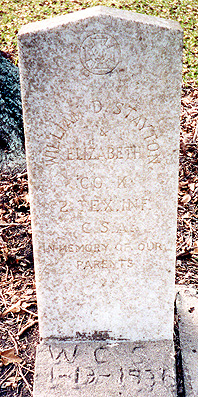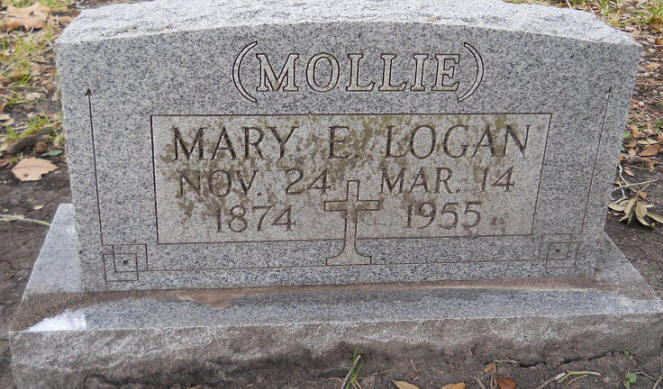|
|
||||||
|
Mr. John L. Logan, 92 years and nine months of age, a pioneer stockman of this county and within two years of being a native Texan, died at the home of his son-in-law, T. J. Poole, Jr., last night, and was laid to rest in Cedarvale cemetery this afternoon, under the auspices of the Masonic lodge of which he was at the time of his death, perhaps, the oldest South Texas member.
Six children, two sons and four daughters, survive him. They are James H., of Blessing; Mrs. Kate Wheeler of Beaumont; Mrs. Louise Dixon of Brownsville; Mrs. T. J. Poole, Jr., of this city and John Logan of Houston. There are also, 25 grandchildren and 18 great-grandchildren.
Mr. Logan retired from business at Blessing about 10 years ago and came to Bay City to make his home with his daughter. In this home every care and attention that could come from loving hands and hearts was bestowed upon him and no desire expressed or anticipated was ever withheld from him.
John L. Logan’s birthplace was in Mississippi, and the date of his first appearance on this earthly stage, January 1, 1836. He was but two years old when his parents removed to Texas, and as soon as he became of sufficient age he became a pupil in the school taught by his father, who continued his work as a teacher in Liberty and Polk counties until 1853. His father’s death the following year left the family without means for support, and, though only in his eighteenth year, young Logan found it incumbent upon himself, as the eldest son, to shoulder the burdens of life and do what he could toward assisting his mother to raise and educate the younger children. His first regular employment was with Tom Sutherland, who gave him work on the farm at a salary of $8 a month—very good wages for a boy as wages then ran; but the work was not exactly such as Mr. Logan fancied, and in 1855 he hired to James Heard to work with cattle, his monthly salary at this place being $15.00.
In 1856, then in his twenty-first year, Mr. Logan selected a location on Luny’s Creek, in Jackson county, and began to improve a place as a home for his mother and the family; and when his work was accomplished to his satisfaction, he again secured employment with a cattleman, Col. Clark I. Owen, with whom he was ranch boss for four years. In this, as in other capacities and employments, his ability and industrious habits won recognition, and, after working the first year for $20 a month, his salary was raised to $30, and was continued at that figure during the remainder of his engagement. The war commencing, Mr. Logan donned the grey uniform early in 1861, and passed thru many thrilling experiences. He was at Vicksburg at the time of his capture by the Northern forces, and, with a companion, paid a Federal soldier $2.50 to be set across the river so that they might make their escape. Mr. Logan was then suffering from a bad wound in the face, and his companion was crippled and forced to walk with crutches; but they managed to walk to Delhi, thirty-five miles away, where they again joined the Southern army.
When the war ended Mr. Logan returned to Jackson county, and was engaged in farming for two years then going back once more to the cattle business, for which he had long before developed a fondness. During the two ensuing years he had charge of a ranch belonging to Henry Snodgrass, and was also employed by other men who had cattle on the range to brand such of their calves as he might be able to find. He received fifty cents for each calf branded and each steer delivered to it owner or to the rendering pens, of which there were several in this section at that time, and made, in all, some $2,000 during the continuance of this arrangement. Allen & Poole were his next employers in the cattle business, and he worked with them until the dissolution of their partnership; then continuing in the employ of S. W. Allen for two years longer at a salary of $100 per month. In the meantime he had been purchasing small herds of cattle, 1,500 head, all told. That year witnessed the most disastrous storm that the cattlemen of Southern Texas have yet experienced. The country was flooded, and many cattle were drowned, but Mr. Logan succeeded in saving a herd of 400 valuable beef steers, keeping them in corrals, though the water came up to their sides, and he had to drive them a long distance—two miles—for grazing. In 1876 he bought and settled upon the tract of land where he now lives, and has since been ranching for himself, but has also done considerable business for other parties in the same line. He has at different times taken contracts to supply herds of cattle at stipulated price, and his extensive acquaintance among the cattlemen of his section enabled him to easily locate the stock wanted and purchase it at a figure which allowed himself a fair margin of profit. Though he has dealt in and raised cattle principally, he has also handled sheep to some extent, and also owns quite a number of horses.
Mr. Logan was naturally of an adventurous disposition, and in his younger days met with many an incident worthy of narration. There were no hostile Indians in his portion of the state, but there were wild animals of nearly all descriptions, and the cowboys encountered them at every turn. On one occasion, while working for Mr. Heard, the ranch force started out to hunt cattle, but separated, agreeing to meet at a stated point. Mr. Logan, a cowboy named Ben Brown and a Mexican were together, and encountered a large bear, which they attempted to rope, but failed, the bear making his escape into a “motte,” where lariats could not be used and horses could not enter. Each member of the trio was anxious for the others to go in and drive Bruin into the “open;” but a cowboy rarely liked to attempt anything that cannot be performed in the saddle, and after wasting a good deal of time they gave up the job in disgust, and hurried on to reach the rendezvous where they were to rejoin their companions. They found the place, but the rest of the party had tired of waiting for them and gone on, and in attempting to follow, the three cowboys soon lost their course, and wandered around for three days before they finally found the other members of their “outfit,” no doubt deciding that their fun with the bear had been dearly purchased.
Shortly after his return from the army Mr. Logan surrendered his independence and his heart as well, the fair captor being Miss Odile LaBauve, a young lady of French ancestry, born in Louisiana in 1845, but a resident of Jackson county at the time of the marriage. She died May 31, 1887, having borne Mr. Logan ten children, as follows: James H., Elizabeth J., Mary E., Catherine O., Matilda V., Elise E., Victor D., Louisa L., Jesse L., and Jno. L., Jr. [In addition, John and Odile had twins, Odelion and Odile who were born May 31, 1887, the day their mother died. The twins died June 26 and 28, 1888 and were buried next to their mother in the LaBauve Cemetery in Francitas, Jackson County.] Victor D. is now dead, the remainder of the children are living and are residents of Texas. Mr. Logan was married again, November 25, 1889, to Mrs. Lizzie Stayton, formerly Miss LaBauve, a cousin of his first wife, and she has made him a most excellent helpmate, as well as an attentive and loving mother to his children.
Mr. Logan now owns about 2,500 acres of land, and has considerable more leased for pasturage, upon which he holds some 500 head of cattle—improved with Durham and other gilt-edged strains—and also 300 sheep and about sixty horses. He has a beautiful home, well improved and most comfortably furnished, and now, after an active and laborious life, he is enjoying the fruits of former hardships and privations, and resting in the sunshine and calm that follows the storm. Hospitable and generous to a fault, he is a true type of the old-school Southwestern ranchman, and is honored and respected by all who know him. Though universally popular, he has never sought political preferment, but has often refused to accept offices that his friends would have pressed upon him, finding more of comfort and pleasure in his home life than in the gilded honors for which so many men choose to strive. Mr. Logan’s and brothers and sisters numbered six, all of whom, perhaps were well known to everyone, especially all of the older people of this entire section. Of these six three are dead, Violet B., who married a Mr. Jordan is dead. So is James B., a Louisiana farmer and Robert C., a stock raiser of this county. Pamelia, now a Mrs. Smith, is living at San Marcos; Mary R., wife of B. B. Rhodes, of this county and Elvira, wife of H. Madden, of Calhoun county, survive. All are well-to-do and well-known in their respective localities.
Daily Tribune, [Bay City, Matagorda County, Texas] October
10, 1928 |
||||||
|
|
||||||
|
||||||
|
||||||
|
Mary E. "Mollie" Logan |
||||||
